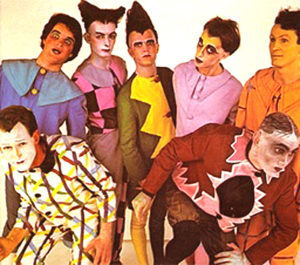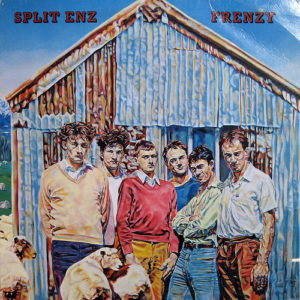1978: What More Could Poor Split Enz Do?
October 3, 2018
By AHNZ
 Split Enz was a great New Zealand band with a catalogue of many brilliant rock pop songs everyone likes. Along with finding international success they have been a great influence to other major musicians, the arts, and culture of The West. No doubt about it!
Split Enz was a great New Zealand band with a catalogue of many brilliant rock pop songs everyone likes. Along with finding international success they have been a great influence to other major musicians, the arts, and culture of The West. No doubt about it!
How to process, then, the fact that in 1978 they nearly faded away but were bailed out by The State? During this time the Enz were still struggling to survive. They had no contract, no record deal, no agent, no manager, no gigs, were on the dole. Out of denial or self-belief, the band kept rehearsing and scribbling over in the UK as debts mounted and seemingly on a sinking ship.
Not a bean to live on- Tim Finn
Tim Finn’s begging letter to Ray Columbus in March 1978 says they had “not a bean to live on”. Archives NZ have not released this letter but quote from it in their post this week (let’s have it all!) Columbus was a mate with connections and former band-mate to the Enz tour manager in Australia. As often happens when the muse dries up, artists like Columbus get bureaucratic roles dolling out State Loot, awards, and licences. He had already used his place on the QEII Arts Council to help subsidise The Enz tour of Australia.
Queen Elizabeth II Arts Council of New Zealand
The QEII Arts Council Act, 1963, was created by National 2.0 leading up to their re-election later that year. They used the age-old trick of naming something after the monarch to make it impossible to criticise, especially while The Queen is visiting (as she was.) Beneath the Teflon coating this was an expansion of the powers of Internal Affairs over New Zealand culture. To “encourage, foster, and promote the practice and appreciation of the arts in New Zealand” as determined by The State. An artificial immortal person “capable of acquiring, holding, and disposing of real and personal property, of suing and being sued.” The elitist arts quango members to be appointed by the Governor-General on recommendation of the Internal Affairs Wizard as a political reward but with money and power. It’s still around today in the form of Creative New Zealand.
Split Enz did not write to the Council nor apply for their $5,000 bail-out money, it was a personal letter to Ray Columbus. As a member of the Arts Council, he did the rest. Nice friend to have.
By 15 May ’78 they had their subsidy on the grounds that Enz were “on the verge of become [sic] a top drawer act in Britain..” with “continuing success.” –* Ref. Press release from Arts Council; AHNZ 2/69/4
If this were true why the 16/5/1978 hand-out? And why the not-a-bean begging for more subsidy? And why did the Arts Council (Hamish Keith himself) request Foreign Affairs pay Enz out of the Cultural Exchange Programme Funds earlier in the month (3 May?) The Secretary of Foreign Affairs shot this down, point out that..
“Our moneys are very limited and should, I believe, be used primarily for artists and groups which are not able to pay their way commercially. Split Enz do not come within this category.”- Min Foreign Affairs; Archives NZ 2/69/4
It’s really hard to maintain this cognitive dissonance of being a really great successful band AND needing State subsidisation because you’re so poor.
Happy Ending?
Enz 1978 welfare cheque really did represent a turning point. The recipients were a Seventies sub-culture of weird harlequin costumes and queer hair and weird songs. They were reacting musically to their early New Zealand lives and it replicated Rocky Horror Picture Show and Peter Gabriel era Genesis and Ziggy Stardust aesthetics. Besides not being something Muldoon’s National 3.0 would pay for, those few who ‘got it’ were moving on; The 1980s was almost here.

After the welfare cheque Enz became the iteration we know and love today. They repaired to studios in the English town previously known as Luton (now part of the Muslim caliphate, isn’t it? Ref. Tommy Robinson) and found their new sound. This led to the album Frenzy (Feb 1979).
Within a year Split Enz was attacking their former benefactor, Muldoon’s National 3.0, for not reforming the tax (Labour 3.0’s 40% sale tax on music) on album sales. The PM had been scathing of the “horrible” music, it wasn’t “culture.” Until listening to songs from Frenzy many would agree.
It’s hard to know what a free market for art, or sports for that matter, would be. All we get are these distortionary signals from The State picking winners, taxing some and injecting stimulants into others. Would Split Enz have made it? In what form? What unseen and unheard artists might New Zealand have produced that were mangled or stillborn because of Statism? What if young artists tried to please the consumer rather than tailor their efforts to please government arts boards?
“It sort of sickens me to see Helen Clark getting up at the music awards and taking the bows,” says Neil Finn in a recent interview with local music mag Real Groove. “Being lauded by the music industry because everyone’s getting a handout. It’s like New Zealand music is taking over the world and it’s all because of Helen.” Finn also adds that, due to generous NZ On Air funding, “people to have unreal expectations for what NZ music can achieve overseas or is actually achieving.”- The Big Idea, 2007
Sounds like Finn was on to something there, but he was very quickly shot down in public by Ray Columbus and other State sycophantics at that time for speaking out of turn. (If I remember rightly, Finn was later roped in to performing for Clark’s election campaign.)
One marvellous year New Zealand will have a free market for music and we’ll all be better off. One benefit will be that politicians and The State pretending to have created or saved the arts as if the artist is the parasite. It’s the other way around!
* This post has resisted the urge to shoehorn lyrics and song titles into the text. Usually I’d be first in line. Thank me?
 Like Comment Share
Like Comment Share





